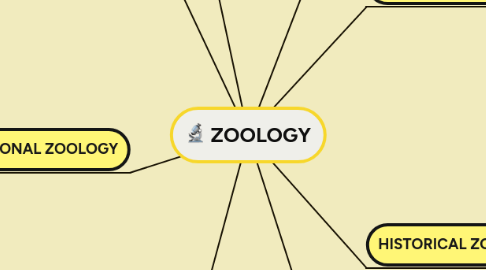
1. STRUCTURAL ZOOLOGY
1.1. Anatomy
1.1.1. this is the structure of an organism and their parts
1.2. Cytology
1.2.1. this is the structure and functions of cells
1.3. Histology
1.3.1. study of tissues. "histos" means tissue
1.4. Morphology
1.4.1. deals with the form of living organisms and its relationship between their structure
2. DEVELOPMENTAL ZOOLOGY
2.1. Embryology
2.1.1. It is a branch of biology that studies the prenatal development of gametes, fertilization, and embryo and fetal development.
2.2. Genetics
2.2.1. Study of heredity. Heredity is a biological mechanism by which a parent transfers certain genes onto their offspring or children.
2.3. Ontogeny
2.3.1. Ontogeny is the origin and growth of an organism, typically from the time of egg-to-adult fertilization. Even the term can be used to refer to the study of the entire lifetime of an organism.
3. FUNCTIONAL ZOOLOGY
3.1. Animal Behavior/Ethology
3.1.1. How animals travel through their habitat, how they communicate socially, how they think about their habitat, and how an animal can understand its environment cognitively
3.2. Animal Physiology
3.2.1. Is a systematic study of the essential properties, functions and processes of animals or their components.
4. SYSTEMATIC/ TAXONOMY
4.1. Conchology
4.1.1. study of shells
4.2. Entomology
4.2.1. study of insects
4.3. Helminthology
4.3.1. study of worms
4.4. Herpetology
4.4.1. study of reptiles/amphibians
4.5. Ichthyology
4.5.1. study of fishes
4.6. Lepidopterology
4.6.1. study of butterflies and moths
4.7. Malacology
4.7.1. study of mollusks
4.8. Nematology
4.8.1. study of nematodes
4.9. Ornithology
4.9.1. study of birds
4.10. Protozoology
4.10.1. study of protozoa
4.11. Ophiology
4.11.1. study of snakes
5. MEDICAL ZOOLOGY
5.1. Parasitology
5.1.1. the study of parasites their hosts, and their relationship.
5.2. Pathology
5.2.1. Is an analysis into the causes and consequences into sickness or injury.
6. DISTRIBUTIONAL ZOOLOGY
6.1. Ecology
6.1.1. Ecology is related to interactions between organisms and their biophysical environment which includes both biotic and abiotic components.
6.2. Zoogeography
6.2.1. Zoogeography is the branch of biogeographic science that deals with the geographic distribution of animal species.
7. HISTORICAL ZOOLOGY
7.1. Evolution
7.1.1. The mechanism by which various types of living organisms are believed to have evolved and diversified from earlier forms during the earth's history.
7.2. Paleontology
7.2.1. Study of fossils to identify and research relationships between species and their environments.
7.3. Phylogeny
7.3.1. History of the evolution of a species or group, in particular as regards the descent lines and the relationships between large classes of organisms.
8. SPECIALIZED FIELDS OF ZOOLOGY
8.1. Molecular Zoology
8.1.1. is a branch of zoology that concerns the molecular basis of biological function, including molecular synthesis, modification, pathways and interactions in and between cells.

